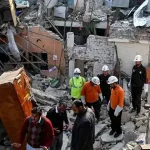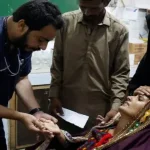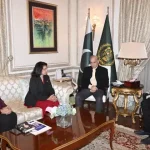Vaccination efforts were boosted on Monday as BioNTech planned millions more doses than expected this year and mass inoculation sites opened across England while the world neared two million pandemic deaths a year since the first fatality was recorded.
As countries across the globe looked forward to vaccines finally allowing a return to normality in the months ahead, WHO experts were also focusing on Covid-19’s origins and planned a mission to China this week to probe the initial outbreak.
The 10 World Health Organisation scientists will visit from Thursday, more than a year after the pandemic began and amid accusations Beijing has tried to thwart the investigation into the virus that has now infected more than 90 million people.
The announcement of the WHO team’s arrival came on the anniversary of the first death confirmed by China in the central city of Wuhan, where a wet market was identified as the first major outbreak of the disease that then spread around the world.
China has largely brought the virus under control, but is tackling a number of local infections, and more than half a million people were placed under lockdown in Beijing on Monday as the government imposed strict measures to stamp out a handful of cases.
Infection numbers were, however, surging across Europe, particularly as Britain coped with a new strain of the disease running rampant, posing the risk of hospitals being overwhelmed.
The virus has also exploded across the United States, the hardest-hit country, and US President-elect Joe Biden was to receive his second dose of the vaccine publicly on Monday as part of efforts to boost confidence.
There were also fears that the full impact of socialising over the holiday season worldwide has not yet been felt. The announcement by BioNTech, the German company that partnered with US firm Pfizer to produce the first vaccine approved in the West, provided some hope as countries face difficulties in distributing and delivering the jabs.
There have also been concerns over whether there will be sufficient vaccine supplies to cover the world’s population. BioNTech said it expects to produce two billion doses in 2021, up from the previous forecast of 1.3 billion.
Britain was the first country to approve the Pfizer/BioNTech jab and has since approved those from Oxford-AstraZeneca and Moderna. On Monday it opened seven mass vaccination sites across England.
“I feel this is the way back,” said Moira Edwards, 88, after receiving her first vaccination. “I can’t understand anybody not wanting to have it.” While wealthier nations in Europe and North America have started vaccination drives, India — with the world’s second-biggest virus caseload — will begin giving shots to its 1.3 billion people from Saturday in a colossal and complex undertaking.
Russian officials said they will trial a one-dose version of the country’s Sputnik V vaccine as they aim to provide a stopgap solution for badly hit countries.
The human and economic toll of the pandemic has caused anger and frustration worldwide, giving even greater political significance to the WHO’s long-awaited investigation mission to China.
The WHO team will “conduct joint research cooperation on the origins of Covid-19 with Chinese scientists”, Beijing’s National Health Commission said in a statement that provided no further details. Beijing has faced international criticism over its lack of transparency during the early days of the pandemic. The United States and Australia have led international calls for an independent inquiry, enraging China.
The anniversary of the first reported death passed by unmarked on Monday in Wuhan, where commuters move freely to work, and parks and riverside promenades buzz with visitors.
“Wuhan is the safest city in China now, even the whole world,” 66-year-old resident Xiong Liansheng said.
The recovery of Wuhan is in sharp contrast to the many parts of the world where the pandemic is still raging, fuelled by new variants that are prompting governments from Israel to Australia to reimpose restrictions, including lockdowns and even curfews.
Pope Francis and Britain’s Queen Elizabeth II became the latest high-profile figures over the weekend to join the global vaccination campaign. The pope denounced opposition to the shots as “suicidal denial”.








